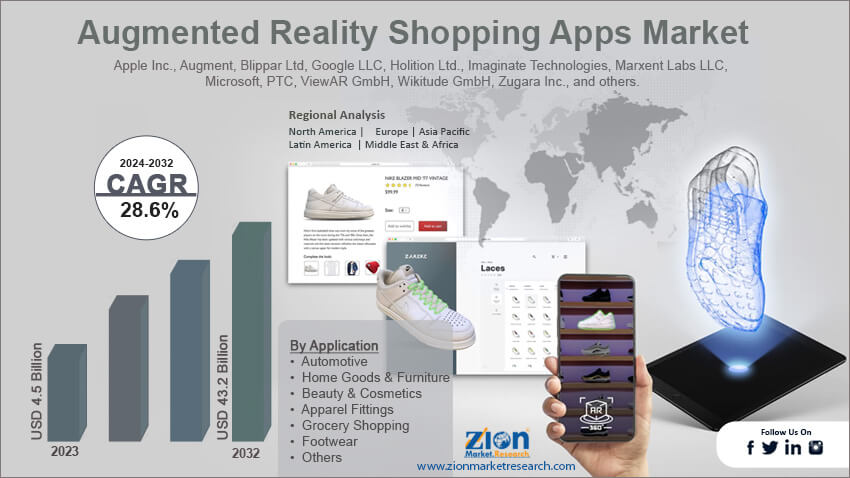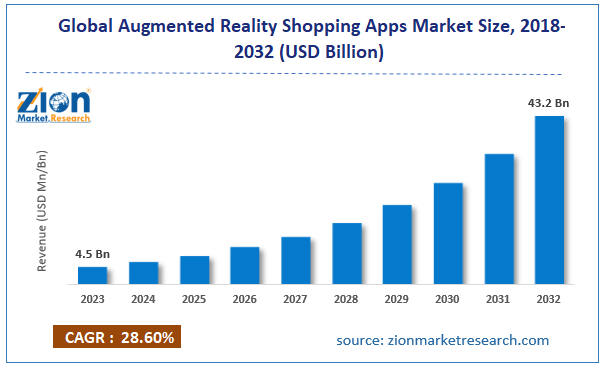Augmented Reality Shopping Apps Market Size, Share, Trends, Growth 2032

Augmented Reality Shopping Apps Market By Component (Solution and Services), By Application (Automotive, Home Goods & Furniture, Beauty & Cosmetics, Apparel Fittings, Grocery Shopping, Footwear, and Others), and By Region - Global and Regional Industry Overview, Market Intelligence, Comprehensive Analysis, Historical Data, and Forecasts 2024 - 2032-
| Market Size in 2023 | Market Forecast in 2032 | CAGR (in %) | Base Year |
|---|---|---|---|
| USD 4.5 Billion | USD 43.2 Billion | 28.6% | 2023 |
Augmented Reality Shopping Apps Industry Prospective:
The global augmented reality shopping apps market size was worth around USD 4.5 billion in 2023 and is predicted to grow to around USD 43.2 billion by 2032 with a compound annual growth rate (CAGR) of roughly 28.6% between 2024 and 2032.
Augmented Reality Shopping Apps Market: Overview
Mobile apps that overlay digital content—like pictures, 3D models, or animations—onto the physical world via a device's camera utilizing augmented reality (AR) technology are known as augmented reality shopping apps. Before making a purchase, these applications let consumers see things in their settings, making the buying experience more engaging and immersive.
The augmented reality shopping apps are being driven by several factors, such as growing smartphone penetration, increasing demand for personalized shopping experiences, enhanced customer engagement, technological advancements, and the rising popularity of social media shopping.
Key Insights
- As per the analysis shared by our research analyst, the global augmented reality shopping apps market is estimated to grow annually at a CAGR of around 28.6% over the forecast period (2024-2032).
- In terms of revenue, the global augmented reality shopping apps market size was valued at around USD 4.5 billion in 2023 and is projected to reach USD 43.2 billion by 2032.
- The increasing product launch is expected to drive the augmented reality shopping apps industry over the forecast period.
- Based on the component, the solution segment is expected to hold the largest market share over the forecast period.
- Based on the application, the automotive segment is expected to grow at the fastest rate during the forecast period.
- Based on region, North America is expected to dominate the market during the forecast period.
 Request Free Sample
Request Free Sample
Augmented Reality Shopping Apps Market: Growth Drivers
Advancement in AR technology drives market growth
Improvements in marker-less tracking and spatial mapping, among other aspects of Augmented Reality (AR) technology, have raised user engagement by improving the quality and accuracy of AR experiences. The increasing need for customized and interactive shopping experiences has also prompted merchants to implement augmented reality (AR) solutions, which let customers visually test things, see how furniture looks and fits in their homes, and get more product details.
Using augmented reality (AR) technology, for instance, the IKEA's Place app allows users to visually arrange new furniture in their homes using a LiDAR scanner on their iPhones to scan the rooms. The use of augmented reality solutions is anticipated to grow over the next several years in several other industries, including the automotive, footwear, and cosmetics sectors, driving the market growth.
Augmented Reality Shopping Apps Market: Restraints
High development cost hinders market growth
The extensive use of Augmented Reality (AR) shopping apps is hindered by high development and maintenance expenses. These expenses, which affect small and large shops, result from several reasons related to the development and maintenance of AR apps. Specialized knowledge of software development, 3D modeling, and graphic design is needed to create AR apps. It might be costly to hire or contract with qualified experts.
Furthermore, advanced technologies like computer vision, machine learning, and real-time rendering are frequently required for AR apps. The original development costs are increased by creating or integrating these technologies. Thus, the high development cost impacts the global augmented shopping apps market.
Augmented Reality Shopping Apps Market: Opportunities
Integration of AR with social media platforms offers a lucrative opportunity for market growth
The use of Augmented Reality (AR) in influencer marketing and its integration with social media sites like Instagram and Snapchat have increased AR's popularity and reach. Furthermore, a greater emphasis on sustainability and fewer product returns have brought attention to AR's advantages in cutting waste and enhancing consumer choices.
Customers may virtually try Sephora's makeup items, for instance, due to its creative smartphone application. By scanning customers' faces, Sephora Virtual Artist employs facial recognition technology to show various product hues. In the upcoming years, the AR shopping industry is anticipated to see significant growth potential due to similar developments by other businesses.
Augmented Reality Shopping Apps Market: Challenges
Privacy and security concern poses a major challenge to market expansion
Concerns about security and privacy have grown in importance as augmented reality (AR) retail apps become more and more popular, both for users and developers. User trust, adoption rates, and market expansion as a whole may all be impacted by these issues. Users using AR shopping apps frequently have to provide personal information, including names, email addresses, and payment information. Privacy issues may result from improper handling or abuse of this data. Additionally, for AR apps to superimpose digital material on the physical world, they need access to a device's camera. Concerns regarding illegal surveillance or improper use of camera data may arise as a result of this access. Thus, posing a major challenge to the augmented reality shopping apps industry.
Augmented Reality Shopping Apps Market: Segmentation
The global augmented reality shopping apps industry is segmented based on component, application, and region.
Based on the component, the global augmented reality shopping apps market is segmented into solutions and services. The solution segment is expected to hold the largest market share over the forecast period because customers are more likely to make purchases after engaging with products in augmented reality. AR features improve the shopping experience and increase conversion rates.
Based on the application, the global augmented reality shopping apps industry is bifurcated into automotive, home goods & furniture, beauty & cosmetics, apparel fittings, grocery shopping, footwear, and others. The automotive segment is expected to grow at the fastest rate during the projected period. The segment expansion is attributed to the increasing sales of passenger vehicles.
For instance, as per the data published by the SIAM, total sales of passenger cars rose from 30,69,523 to 38,90,114. In comparison to the prior year, sales of passenger cars rose from 14,67,039 to 17,47,376, utility vehicles from 14,89,219 to 20,03,718 and vans from 1,13,265 to 1,39,020 units in FY-2022-23.
Augmented Reality Shopping Apps Market: Report Scope
| Report Attributes | Report Details |
|---|---|
| Report Name | Augmented Reality Shopping Apps Market |
| Market Size in 2023 | USD 4.5 Billion |
| Market Forecast in 2032 | USD 43.2 Billion |
| Growth Rate | CAGR of 28.6% |
| Number of Pages | 219 |
| Key Companies Covered | Apple Inc., Augment, Blippar Ltd, Google LLC, Holition Ltd., Imaginate Technologies, Marxent Labs LLC, Microsoft, PTC, ViewAR GmbH, Wikitude GmbH, Zugara Inc., and others. |
| Segments Covered | By Component, By Application, and By Region |
| Regions Covered | North America, Europe, Asia Pacific (APAC), Latin America, Middle East, and Africa (MEA) |
| Base Year | 2023 |
| Historical Year | 2018 to 2022 |
| Forecast Year | 2024 - 2032 |
| Customization Scope | Avail customized purchase options to meet your exact research needs. Request For Customization |
Augmented Reality Shopping Apps Market: Regional Analysis
North America dominates the market over the projected period
North America is expected to lead the global augmented reality shopping apps market growth during the forecast period. It is ascribed to the region's thriving e-commerce industry, high rate of smartphone adoption, and solid consumer desire for cutting-edge technologies. Numerous potential possibilities for AR adoption have been made possible by North America's established retail infrastructure, substantial expenditures in digital transformation, and customer experience initiatives.
Additionally, merchants are using augmented reality (AR) as a major differentiator to improve customer engagement and boost sales due to the region's competitive market dynamics. On the other hand, the Asia Pacific is expected to grow at a rapid rate over the forecast period. The expansion of the regional market is driven by the growing urbanization and increasing adoption of this technology from several industries.
Augmented Reality Shopping Apps Market: Competitive Analysis
The global augmented reality shopping apps market is dominated by players like:
- Apple Inc.
- Augment
- Blippar Ltd
- Google LLC
- Holition Ltd.
- Imaginate Technologies
- Marxent Labs LLC
- Microsoft
- PTC
- ViewAR GmbH
- Wikitude GmbH
- Zugara Inc.
The global augmented reality shopping apps market is segmented as follows:
By Component
- Solution
- Services
By Application
- Automotive
- Home Goods & Furniture
- Beauty & Cosmetics
- Apparel Fittings
- Grocery Shopping
- Footwear
- Others
By Region
- North America
- The U.S.
- Canada
- Europe
- France
- The UK
- Spain
- Germany
- Italy
- Rest of Europe
- Asia Pacific
- China
- Japan
- India
- South Korea
- Southeast Asia
- Rest of Asia Pacific
- Latin America
- Brazil
- Mexico
- Rest of Latin America
- Middle East & Africa
- GCC
- South Africa
- Rest of Middle East & Africa
Table Of Content
Methodology
FrequentlyAsked Questions
Mobile apps that overlay digital content—like pictures, 3D models, or animations—onto the physical world via a device's camera utilizing augmented reality (AR) technology are known as augmented reality shopping apps. Before making a purchase, these applications let consumers see things in their settings, making the buying experience more engaging and immersive.
The augmented reality shopping apps are being driven by several factors such as growing smartphone penetration, increasing demand for personalized shopping experiences, enhanced customer engagement, technological advancements, and rising popularity of social media shopping.
According to the report, the global augmented reality shopping apps market size was worth around USD 4.5 billion in 2023 and is predicted to grow to around USD 43.2 billion by 2032.
The global augmented reality shopping apps market is expected to grow at a CAGR of 28.6% during the forecast period.
The global augmented reality shopping apps market growth is expected to be driven by North America. It is currently the world’s highest revenue-generating market due to the presence of the major players.
The global augmented reality shopping apps market is dominated by players like Apple Inc., Augment, Blippar Ltd, Google LLC, Holition Ltd., Imaginate Technologies, Marxent Labs LLC, Microsoft, PTC, ViewAR GmbH, Wikitude GmbH, and Zugara Inc. among others.
The augmented reality shopping apps market report covers the geographical market along with a comprehensive competitive landscape analysis. It also includes cash flow analysis, profit ratio analysis, market basket analysis, market attractiveness analysis, sentiment analysis, PESTLE analysis, trend analysis, SWOT analysis, trade area analysis, demand & supply analysis, Porter’s five forces analysis, and value chain analysis.
HappyClients
Zion Market Research
Tel: +1 (302) 444-0166
USA/Canada Toll Free No.+1 (855) 465-4651
3rd Floor,
Mrunal Paradise, Opp Maharaja Hotel,
Pimple Gurav, Pune 411061,
Maharashtra, India
Phone No +91 7768 006 007, +91 7768 006 008
US OFFICE NO +1 (302) 444-0166
US/CAN TOLL FREE +1 (855) 465-4651
Email: sales@zionmarketresearch.com
We have secured system to process your transaction.
Our support available to help you 24 hours a day, five days a week.
Monday - Friday: 9AM - 6PM
Saturday - Sunday: Closed






